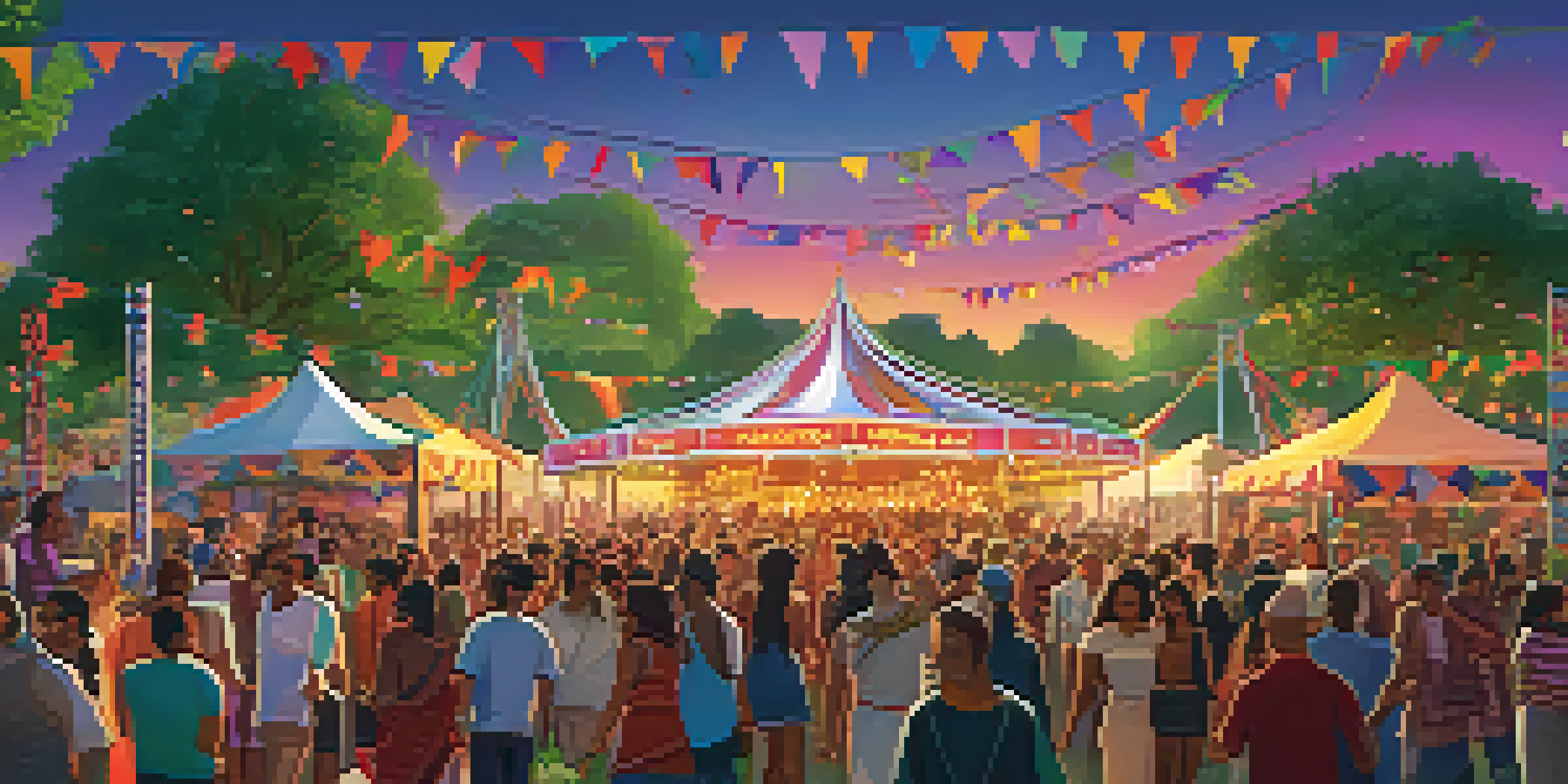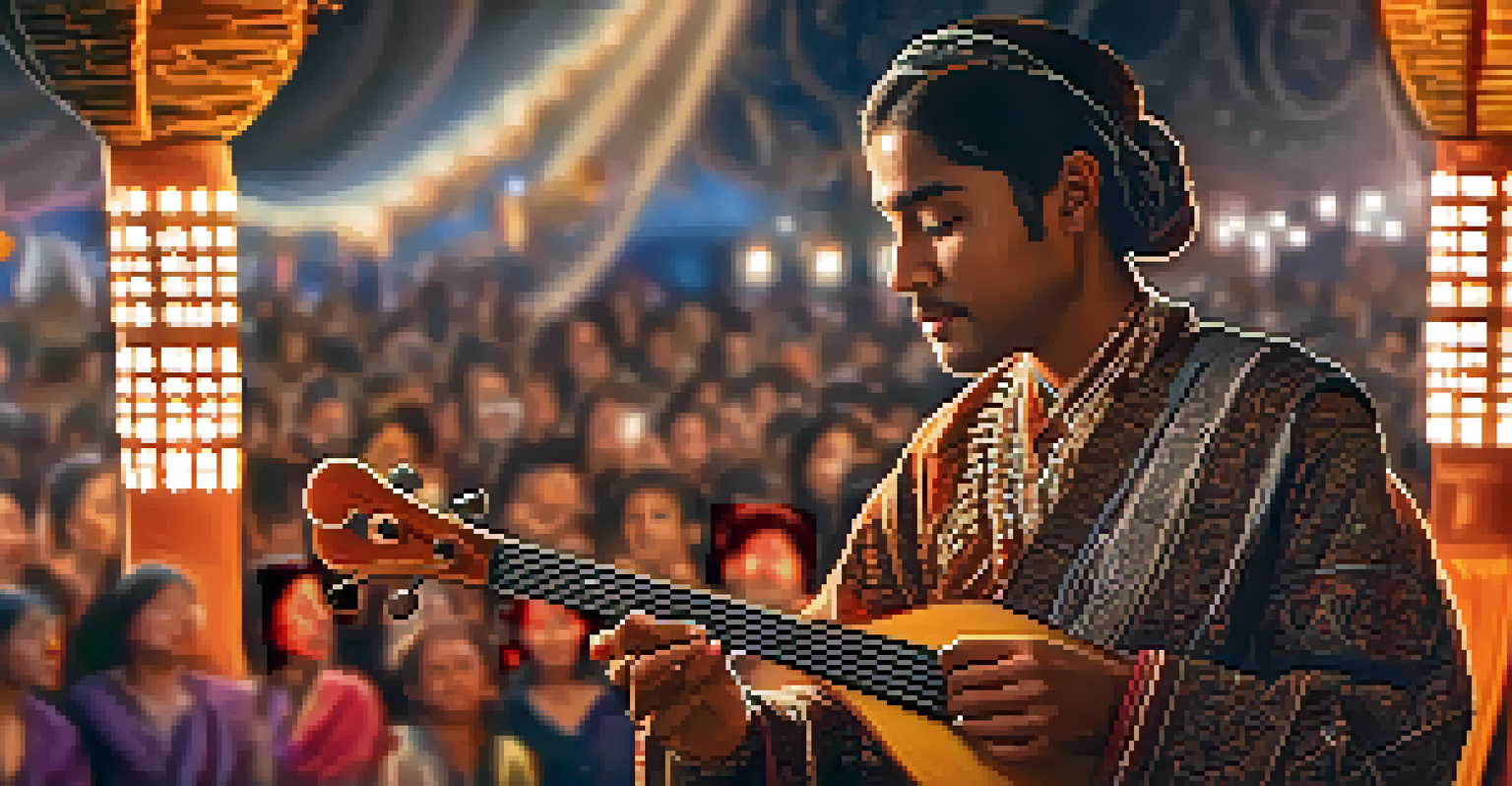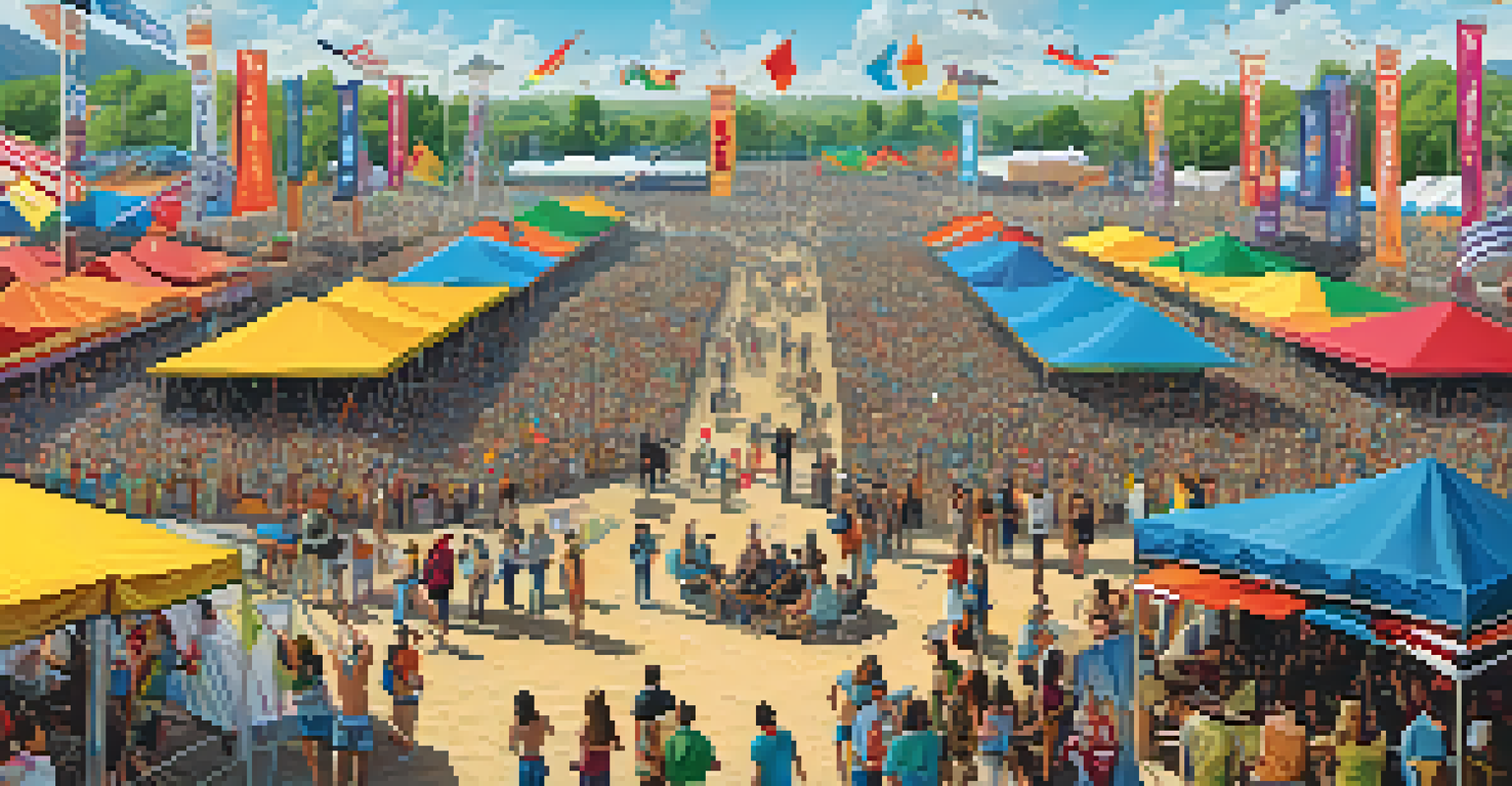Music Festivals as Catalysts for Cultural Exchange and Dialogue

Music Festivals: A Global Gathering of Cultures
Music festivals are more than just a celebration of sound; they serve as vibrant melting pots for diverse cultures. These events attract attendees from various backgrounds, creating a rich tapestry of experiences and traditions. For instance, the Glastonbury Festival in the UK sees participants from all over the world, each bringing their unique cultural influences to the mix.
Music is the universal language of mankind.
Through shared musical experiences, attendees engage with different customs, food, and art forms, fostering an environment of mutual appreciation. Imagine dancing alongside someone from a different country, both of you moving to the same beat but with entirely different life stories. This shared experience helps break down barriers and promotes understanding.
As people bond over their love for music, they also exchange ideas, dialogue, and perspectives that transcend language and cultural differences. In this way, music festivals become not just events, but powerful platforms for cultural dialogue and connection.
The Role of Music in Bridging Cultural Gaps
Music has a unique ability to resonate with people on an emotional level, making it an ideal medium for cultural exchange. When people hear a song that speaks to them, it often evokes feelings and memories that can lead to meaningful conversations. This emotional connection creates a bridge that can unite individuals from vastly different backgrounds.

For instance, the Coachella Valley Music and Arts Festival showcases artists from various genres and cultures, providing attendees with a chance to experience the richness of global music. When someone hears a traditional folk song from another country, it can spark curiosity about that culture, leading to discussions about its history and significance.
Music Festivals Unite Cultures
These events serve as vibrant melting pots where diverse backgrounds and traditions come together through shared musical experiences.
Ultimately, music serves as a universal language that encourages exploration and understanding. By engaging with different musical styles, festival-goers open themselves up to new perspectives and experiences that can enrich their own lives.
Creating a Safe Space for Dialogue
Music festivals often cultivate an atmosphere of acceptance and openness, which is essential for meaningful dialogue. With a shared love for music, attendees are usually more willing to connect with others, discuss their differences, and celebrate their uniqueness. This environment encourages people to express their thoughts and feelings freely, fostering a sense of community.
The power of music makes all the difference in our lives; it can bridge cultures, heal wounds, and unite us as human beings.
For example, the Rainbow Serpent Festival in Australia is known for its inclusive atmosphere, where individuals from diverse backgrounds come together to celebrate art, music, and culture. This sense of belonging enables participants to engage in conversations that they might not have felt comfortable having elsewhere.
In such spaces, individuals can learn from one another, share their stories, and find common ground. This dialogue not only enhances personal connections but also promotes social cohesion, allowing for a richer cultural exchange.
Showcasing Diverse Musical Traditions
One of the most exciting aspects of music festivals is their ability to showcase a wide array of musical traditions. By featuring artists from different genres and cultural backgrounds, festivals provide a platform for lesser-known music styles to reach a broader audience. This exposure helps to preserve and promote diverse musical heritages.
For instance, the WOMAD (World of Music, Arts and Dance) festival highlights artists from around the world, allowing festival-goers to experience traditional music from cultures they may not have encountered otherwise. This not only educates attendees but also honors the artists and their cultural roots.
Music as a Universal Language
Music fosters emotional connections that enable cultural exchange and promote understanding among individuals from different backgrounds.
As participants enjoy these performances, they gain insight into the stories and histories behind the music. This learning experience fosters a deeper appreciation for cultural diversity and encourages attendees to explore music beyond their usual preferences.
The Impact of Cultural Exchange on Artists
Cultural exchange at music festivals isn't just beneficial for attendees; it also has a profound impact on the artists themselves. Musicians often draw inspiration from the diverse audiences and cultures they encounter at these events. This interaction can lead to collaborations that blend different musical styles, creating innovative sounds.
For example, an artist from Africa may collaborate with a DJ from Europe, resulting in a fusion of traditional beats and modern electronic music. These collaborations not only expand the artists' creative horizons but also introduce their audiences to new influences and ideas.
Moreover, artists can gain valuable insights into the cultural significance of their work as they engage with fans from different backgrounds. This two-way dialogue enriches their artistry and strengthens their connection to the global music community.
Fostering Global Citizenship Through Music
Participation in music festivals can cultivate a sense of global citizenship among attendees. As individuals engage with diverse cultures and perspectives, they become more aware of global issues and interconnectedness. This understanding can inspire them to take action and contribute positively to the world around them.
For instance, festivals often promote social causes, encouraging attendees to support initiatives related to environmental sustainability, human rights, and cultural preservation. This engagement fosters a sense of responsibility and connection to a larger community, beyond just the festival experience.
Future of Festivals and Inclusivity
As technology advances, music festivals will increasingly showcase diverse lineups and facilitate cultural dialogue, enriching the global music community.
By embracing the values of empathy, respect, and inclusivity, music festival-goers can return to their own communities with a renewed commitment to fostering understanding and positive change.
The Future of Cultural Exchange at Music Festivals
As the world becomes increasingly interconnected, the role of music festivals in facilitating cultural exchange will only grow. With advancements in technology, festivals can reach wider audiences, allowing for more diverse participation and engagement. Virtual festivals and live streams can also bring together people from different parts of the world, breaking down geographical barriers.
Furthermore, as society continues to prioritize inclusivity and representation, music festivals will likely evolve to feature even more diverse lineups, showcasing artists from underrepresented communities. This commitment to diversity can enrich the festival experience and promote a deeper understanding of cultural nuances.

Ultimately, the future of music festivals holds great potential for enhancing cultural dialogue and exchange. By embracing these opportunities, we can create a more harmonious world where music serves as a catalyst for connection and understanding.